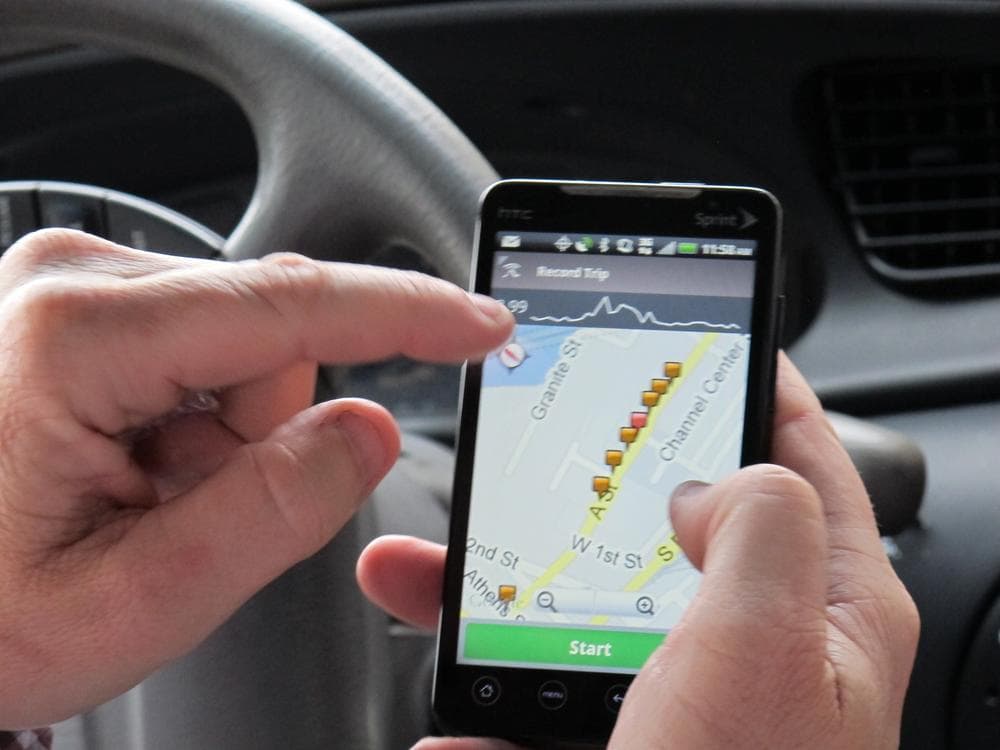Advertisement
Hit A Pothole? Tell Boston With New Smartphone App
People use smartphone applications for work, games, fitness training, tip calculating and hundreds of other useful and entertaining purposes. Now the City of Boston wants anyone who drives in the city to use their smartphone to report potholes as they pass over them.
To see how the city's new app, Street Bump, works, I rode along with an early tester, Michael Dennehy, a city employee whose job takes him all over Boston.
Dennehy drives across the James Kelly Bridge toward South Boston on West Broadway and heads for a particularly bad strip of road. And soon enough we hit a rough patch and the app starts to record each big bump with an electronic chime.

The app doesn't pick up the small vibrations, but it is recording the larger ones.
"That's what we’ve found. If you see something that we are approaching that you think should get a bump, nine times out of 10 we receive the bump," Dennehy said.
Here's how it works: When the app is on, it detects when there’s a change in vertical acceleration, or a bump. It captures a second worth of data from the accelerometer, timestamps it, and attaches it to the GPS location. At the end of the trip you press a button to upload the bump locations to a server running an algorithm that recognizes potholes. Once a road defect is detected by three different people, it automatically gets on the list to get fixed.
"This only works because we’re actually pretty good at filling potholes," said Nigel Jacob, co-chair of the mayor’s office of New Urban Mechanics, which developed the Street Bump app.
Jacob says Boston workers fill reported potholes within a day-and-a-half. But he says this app isn’t just about fixing potholes, it’s about how the city is trying to connect with its residents.
Advertisement
"This is a way to engage the public in a new, more effective way and really shore up the trust that they have in us, that we are trying to deliver a valuable service," Jacob said.
There are some drawbacks to Street Bump. The app can drain a cellphone battery and limits your ability to do anything else on your phone (which you shouldn’t be doing while driving anyway). Some people may have privacy concerns because it tracks where you are, but Jacob says the app does not collect any personal information and you have to opt-in every time it's activated.
The app cost the city about $80,000 to develop in partnership with the Worcester Polytechnic Institute, and will be free to download next month.
Boston residents have already been using their smartphones to report other problems to the city. Over two years ago, New Urban Mechanics launched the Citizens Connect app, which allows you to email a picture of a pothole, graffiti or other problems and file a report. More than 27,000 requests have been lodged this way.
New Urban Mechanics co-chair Chris Osgood says Citizens Connect and Street Bump help make government more personal by "actually figuring out ways to make sure government isn't this faceless concrete building.
"But a resident really understands where their tax dollars are going and who is doing work on their behalf to make the city better," Osgood said. "And where residents can really see, 'Oh, my drive to work is now smoother because I ran Street Bump.' "
Revolutionizing city government, one pothole at a time.
This program aired on April 24, 2012.